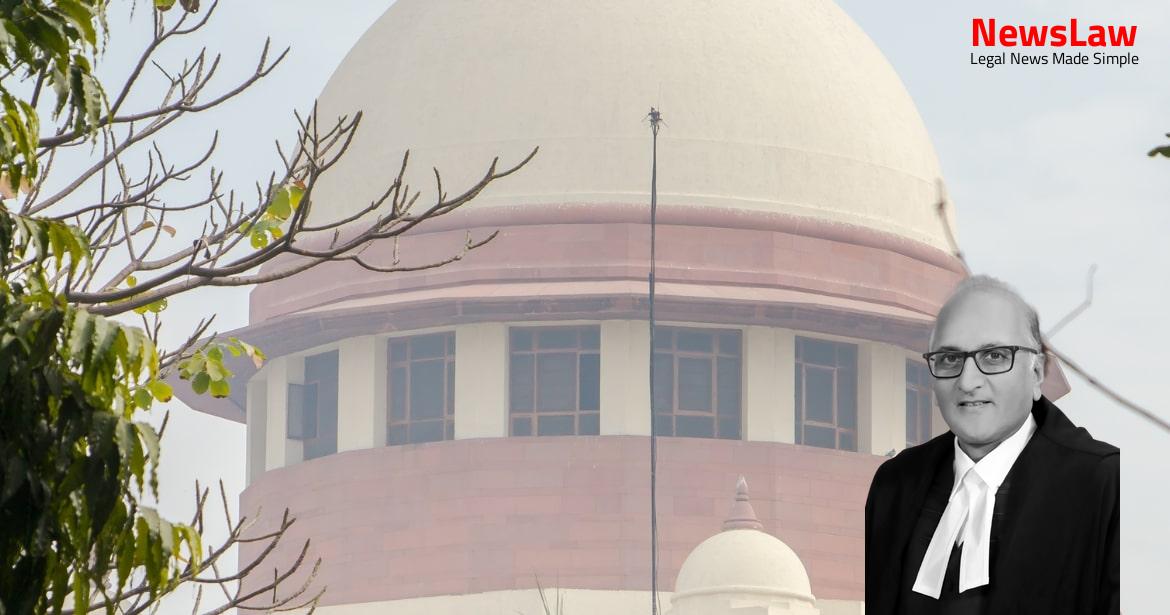In a recent legal case involving employment dismissal, the court’s focus on ensuring a fair inquiry process stands out. By emphasizing the principles of Natural Justice, the court aims to uphold integrity and fairness in disciplinary proceedings. The significance of following due process and providing opportunities for the defense to present their case is highlighted, setting a precedent for similar cases in the future. Let’s delve into the intricate legal analysis that underpins decisions in employment law.
Facts
- District Collector of Salem District, Tamil Nadu, appeals against the High Court’s decision to reinstate the respondent Panchayat Assistant with back wages.
- The respondent was accused of misappropriation of funds along with the ex-President of Samuthram Panchayat.
- The High Court previously quashed the order of dismissal due to lack of proper inquiry and remanded the case for fresh disposal.
- The Division Bench of the High Court upheld the Single Judge’s decision to reinstate the respondent with full back wages, leading to the current appeal before the Supreme Court.
- Delinquent was not given a copy of the Inquiry Report
- No opportunity was given to the delinquent to comment on the Inquiry Officer’s Report
- A fresh order was passed without following due process
- The delinquent filed a writ petition before the High Court
- Upon remand, the inquiry was conducted with an opportunity for the delinquent to defend his case
Also Read: Challenging Legal Presumptions in Negotiable Instrument Cases
Arguments
- The appellant argues that if the High Court found the punishment order to be in breach of Natural Justice, the matter should have been remanded to the Disciplinary Authority for a fresh inquiry.
- The appellant cites the seriousness of the misappropriation charge against the respondent and references specific legal cases to support their argument.
- On the other hand, the respondent’s counsel opposes the appeal, stating that the High Court did not err in setting aside the dismissal order and ordering reinstatement with full back wages.
- The respondent’s counsel highlights that despite a previous remittance of the case for a fresh inquiry, the order of dismissal was again passed in violation of Natural Justice principles.
- It is argued that granting repeated opportunities to the Disciplinary Authority to issue fresh orders is not appropriate, as emphasized by the Division Bench.
- The respondent has been suffering since 2006, which is a significant amount of time.
- The High Court’s judgment should not be interfered with considering the respondent’s prolonged suffering.
- No loss was caused to the Panchayat as the entire amount in question was deposited by the Panchayat President.
- The High Court’s decision to not order a remand to the Disciplinary authority is deemed appropriate in this case.
Also Read: Legal Analysis of Admission Irregularities in Educational Institutions
Analysis
- The High Court should have remitted the matter back to the Disciplinary Authority for a proper inquiry.
- Documents mentioned in the charge sheet were not supplied to the delinquent officer, violating principles of natural justice.
- If an inquiry is not conducted properly or violates natural justice, the court cannot reinstate the employee.
- The case of Chairman, Life Insurance Corporation of India v. A. Masilamani was cited to support the need for proper inquiry procedures.
- The order of dismissal was set aside due to a breach of principles of Natural Justice.
- The Inquiry Officer’s Report was not furnished to the delinquent, and his comments were not sought, leading to the dismissal being overturned.
- Reference made to a recent decision in the case of Rajit Singh where an earlier decision in the case of A. Masilamani was considered.
- The case is to be remitted to the disciplinary authority for conducting an enquiry from the point where it was vitiated and concluding the same.
- Citing relevant cases such as ECIL v. B. Karunakar, Hiran Mayee Bhattacharyya v. S.M. School for Girls, U.P. State Spg. Co. Ltd. v. R.S. Pandey, and Union of India v. Y.S. Sadhu.
- Applying the principles of Natural Justice to the facts of the case, the order of dismissal was set aside for being in breach of those principles.
- High Court should have remitted the case to the Disciplinary Authority for a fair inquiry
- The inquiry should resume from the point where it was found to be vitiated
- The delinquent should be provided with a copy of the Inquiry Report
- Opportunity should be given to the delinquent to submit comments on the Inquiry Officer’s Report
Also Read: Quashing of Enhanced Tuition Fee in Private Medical Colleges
Decision
- The dismissal order was previously set aside for breaching Natural Justice principles
- Fresh order of dismissal found to violate Natural Justice principles again
- Present appeal allowed with costs to be paid by the appellant to the respondent – delinquent
- Impugned judgments and orders for reinstatement with back wages are quashed and set aside
- Case remitted to the Disciplinary Authority to conduct a fair inquiry process
Case Title: THE INSPECTOR OF PANCHAYATS AND DISTRICT COLLECTOR SALEM Vs. S. ARICHANDRAN (2022 INSC 1016)
Case Number: C.A. No.-006776-006776 / 2022



